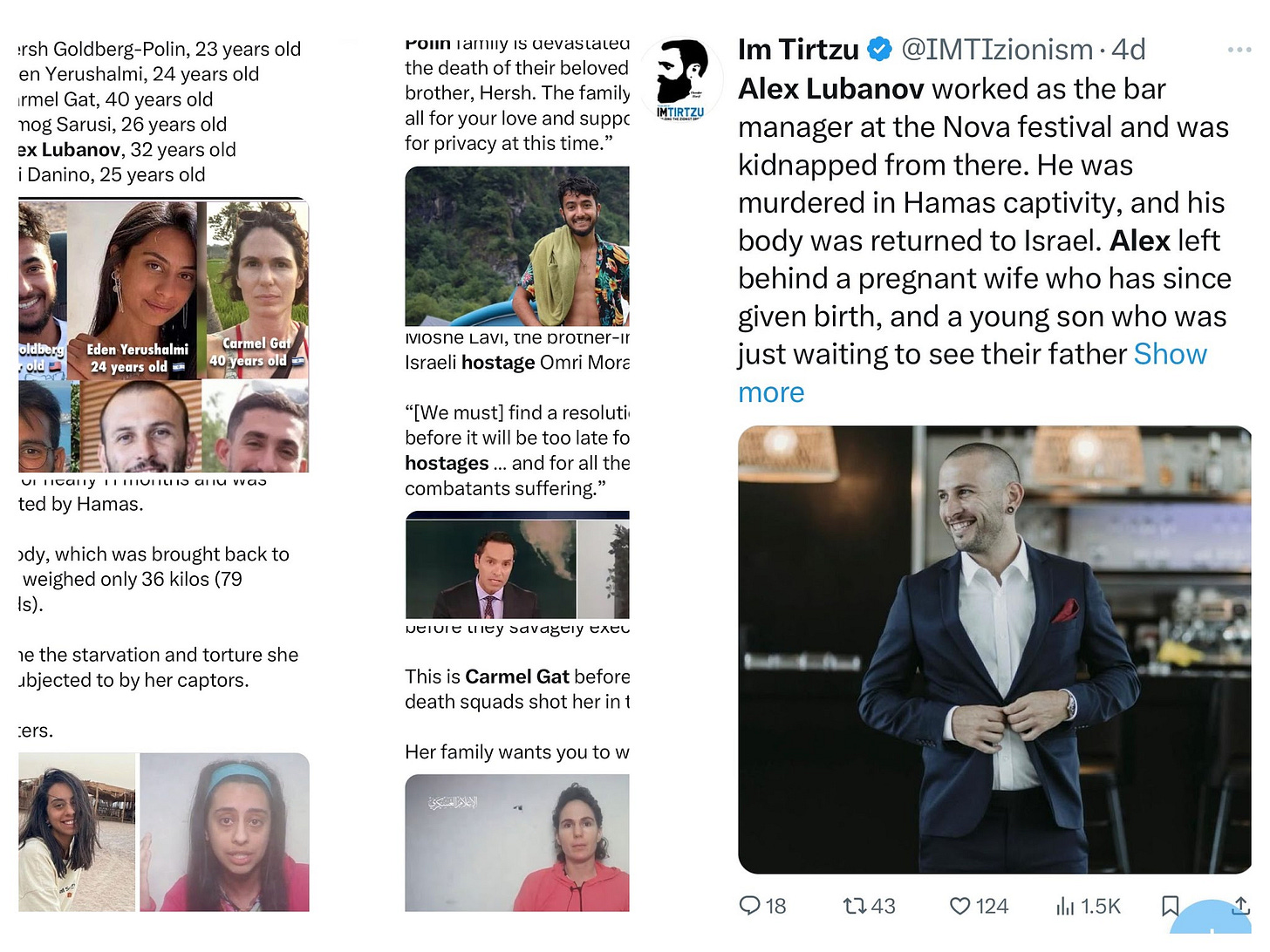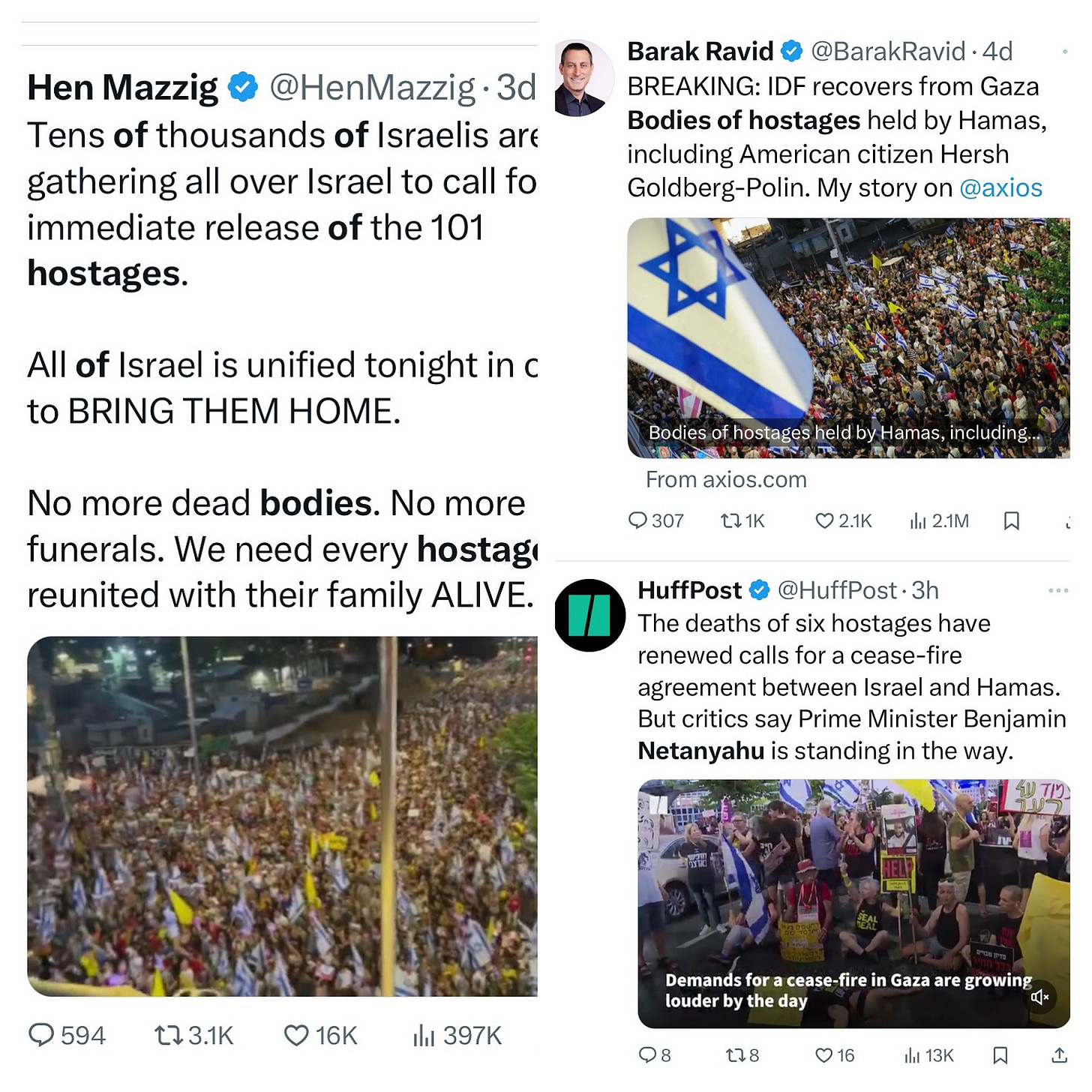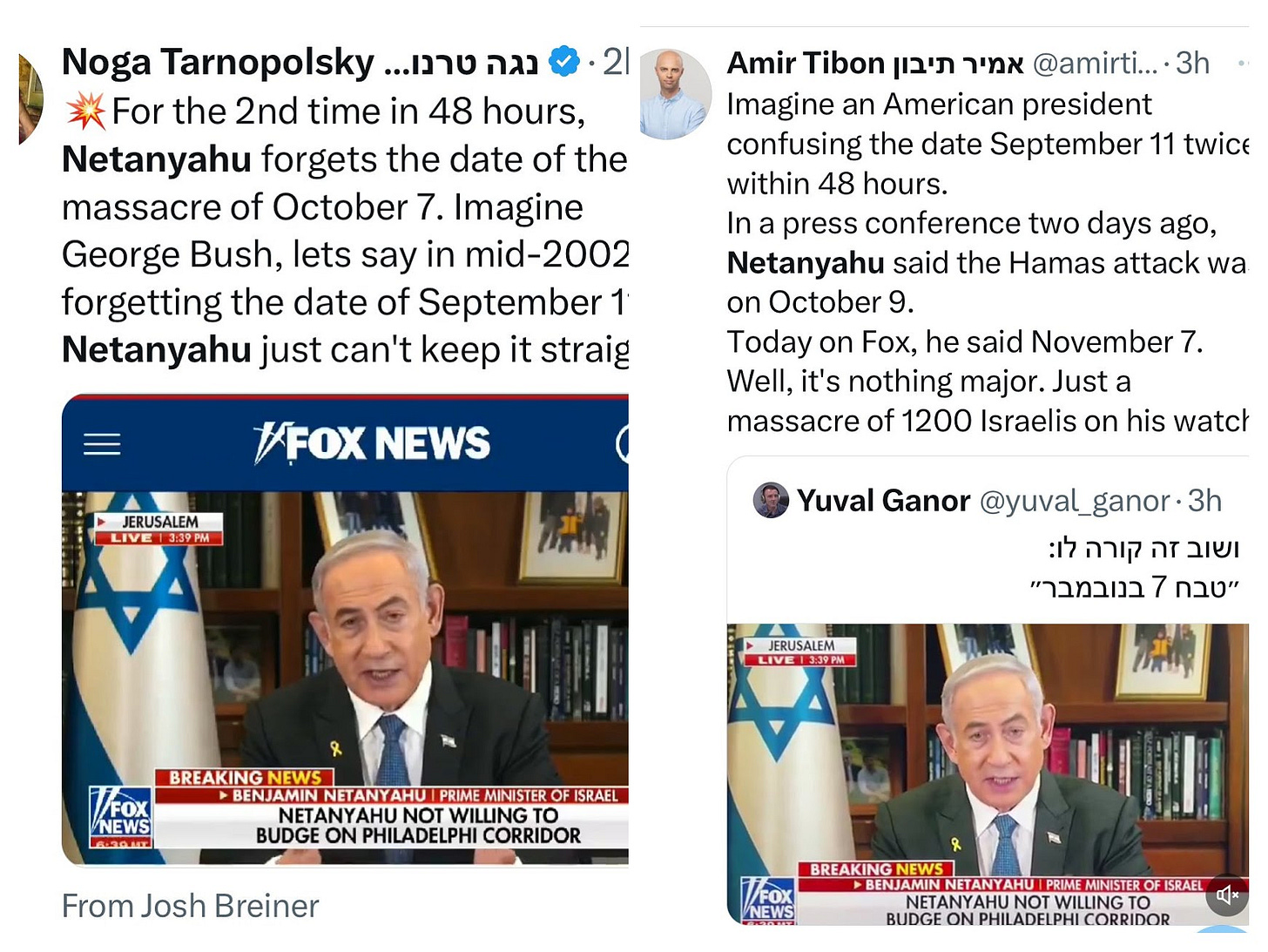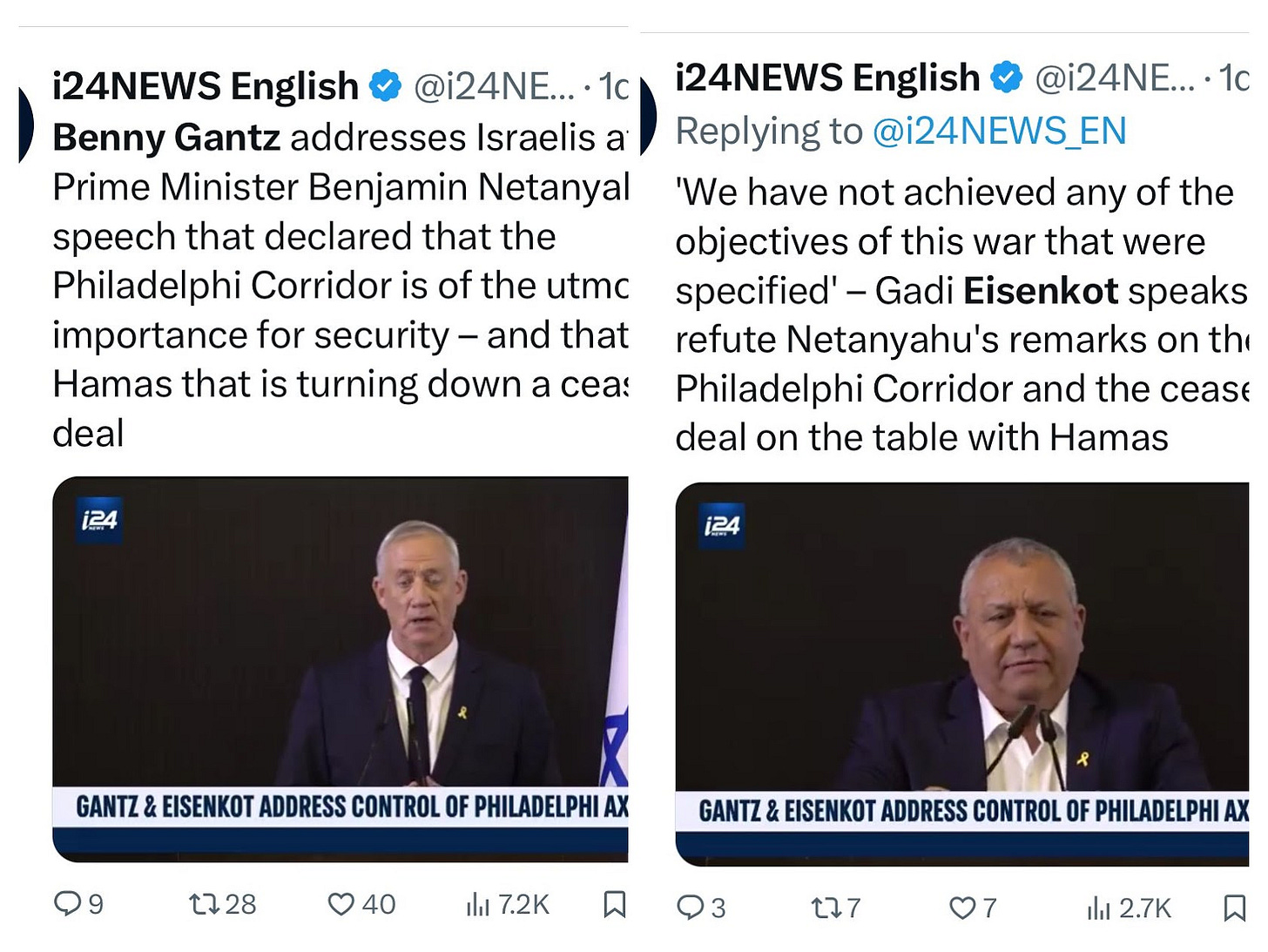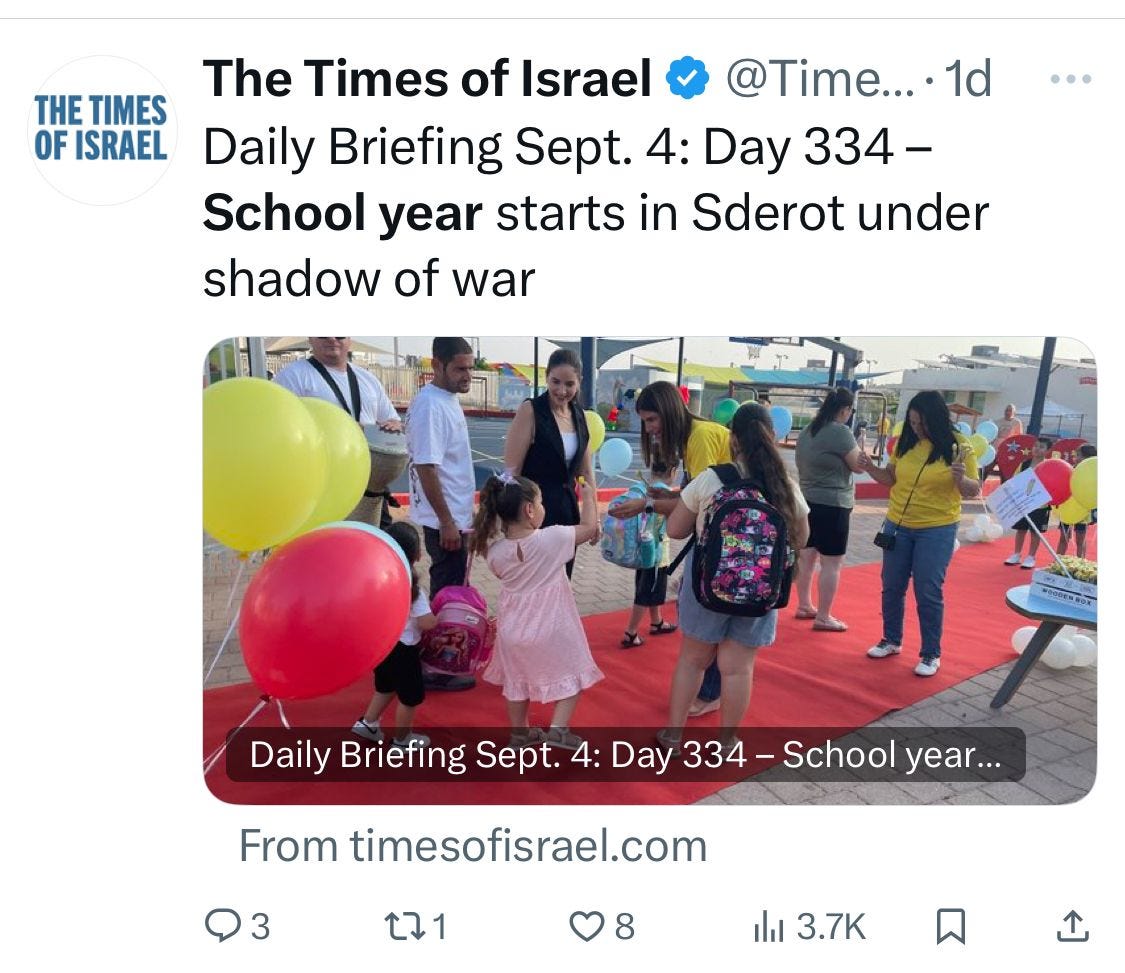Israel Weekly News Roundup - Sep 6, 2024
This week's News Roundup will depart from the usual five-subject format and be devoted to a number of items concerning the war, the hostage situation, the political environment, and the general state of Israel at the present time as we approach the first anniversary of October 7.
Israel at War - Day 336
Bodies of Six Dead Hostages Brought to Israel
Early Sunday morning, the IDF announced that it had found the bodies of six hostages kidnapped by Hamas on October 7: Almog Sarusi, Alex Lobanov, Carmel Gat, Eden Yerushalmi, Ori Danino and Hersh Goldberg-Polin. In a statement, an IDF spokesperson stated that the six were killed by Hamas shortly before the army arrived at their location, a 20-meter-deep tunnel in Rafah. Autopsy reports indicated that the hostages were shot in the head from close range, on Thursday night or Friday, hours after the security cabinet voted to keep an Israeli military presence at the Philadelphi route. The Philadelphi route is a corridor that runs along the southern border of Gaza with Egypt. The autopsy report also indicated that while the hostages killed by Hamas were in frail condition, no other signs of physical trauma were found on the bodies, and that they could have survived. After the bodies of the hostages were returned to Israel, Hamas released videos of four of the slain hostages, taken shortly before they were shot by their captors.
Three of the six hostages, Hersh Goldberg-Polin, a dual Israeli-American, Eden Yerushalmi, and Carmel Gat, were supposed to be released in the first stage of the hostage/cease-fire deal still being negotiated. A source told the Ha’aretz news outlet that "They appeared in the lists given over at the beginning of July. It was possible to bring them back alive," the source said.
Following the bitter news, the hostage families requested from PM Netanyahu that he make a public appearance. Instead, he released a recorded statement saying: "Hamas refuses to negotiate. Those who murder hostages don't want a deal." In response, the Hostage Families Forum called on the prime minister to "Take responsibility for your mistakes. Take responsibility for torpedoing the deal. Take responsibility for the abandonment. Take responsibility for the hostages who were murdered in captivity”. Defense Minister Yoav Gallant said the security cabinet must immediately convene and reverse its decision regarding the Philadelphi route, and added: "it is too late for the hostages who were murdered in cold blood, but hostages who remain alive in captivity must be returned”.
Protests in Support of Immediate Ceasefire/Hostage Deal
In the days following the news of the deaths of the six hostages, hundreds of thousands of Israelis took to the streets in Tel Aviv, Jerusalem, Haifa and numerous other locations around the country to protest in favor of a hostage release deal. Protestors blocked highways and key junctions, and disrupted train movement. Dozens were detained by the police who used excessive force, mounted officers, water cannons and the infamous “skunk” added to water to disperse the crowds.
Following pressure from the public and the forum of business and industrial leaders, and after a meeting with representatives of the hostage families’ forum, the Chairman of the Histadrut, Israel’s national organized labor union, announced a general strike on Monday this week. At a press conference, alongside the families, the Histadrut chairman said that he was convinced that the government sabotaged the hostage/ceasefire deal for political reasons.
The strike, which started at 6 am ended at 14:30 the same day after the government appealed to the labor court to issue an injunction, claiming the strike was clearly political and not related to workers’ rights or a labor rights dispute.
At a cabinet meeting, PM Netanyahu slammed the Histadrut's chairman, saying that the general strike plays into the hands of Hamas leader Sinwar. Minister of Finance Smotrich echoed the same message on social media, warning public sector employees that they will not get paid should they participate in the strike.
PM Netanyahu Addressed Israelis Trying to Explain His Agenda
In his first public announcement since the discovery of the six bodies of the hostages in Gaza PM Netanyahu addressed the families directly on Monday night and said he is sorry. Sorry that he was unable to rescue their loved ones.
But the majority of his speech was dedicated to a long well-planned explanation of his negotiating terms for Hamas. He used a map to mark the main line which in his view is an existential point. This is the 14 km (8.6 miles) border between Egypt and Gaza Strip. In Israeli military jargon it is called the Philadelphi corridor. PM Netanyahu explained that for him it is an essential condition, that the IDF stays in control, to make sure that no ammunition or other military materiel is transferred to Hamas from Egypt. He showed the place on the map, explained why it is existential, and why it is not negotiable. PM Netanyahu neglected to say that Israel occupied this border only six months into the war, he also neglected to explain why it was never mentioned before.
His 40-minute speech was live broadcast on all TV media outlets in the country. When he finished, he allowed some questions from the press. On Wednesday PM Netanyahu had a press conference in English for the foreign press corps in Israel.
Opposition leaders, Benny Gantz and Gadi Eisenkot Responded to PM Netanyahu in a Live Press Conference
Benny Gantz and Gadi Eisenkot, leaders of the Blue-White party, held a press conference in which they responded to PM Netanyahu and expressed their views on the existential condition he placed on the need to stay in control of the border between Egypt and Gaza Strip, the Philadelphi corridor. Blue-White party decided to take a responsible posture in their eyes and after the October 7th attack, decided to join PM Netanyahu government to show unity and help him lead the war in Gaza. They subsequently joined the war cabinet. Both were ex IDF chiefs of staff and had the most relevant experience to advise on military strategies. But a few months ago they decided that they can no longer support his policies and decided to resign from the government. After their departure the war cabinet was dissolved and subsequently PM Netanyahu often makes decisions by himself, without including them in the cabinet.
Both contradicted PM Netanyahu’s announcement about the existential need for the corridor, and were supported by the heads of all state security agencies, IDF, Shin Beit and Mossad, all stating that staying on the border between Gaza and Egypt is reversible and Israel can easily regain control of needed.
Biden Administration Trying to Revive The Hostage Negotiations
President Biden and VP Harris held a meeting with the American negotiators who returned from Qatar, and are now making efforts to revive the almost dead channel of negotiations aimed at releasing the hostages from Gaza and ending the war. Some analysts in Israel and the US assume that they will present the sides with a last chance deal. Many, including President Biden, accuse PM Netanyahu of putting obstacles in the way, every time there is a chance to close the gaps between the sides. Many accuse him for making decisions according to personal political benefits and weighing things according to whether they strengthen his political existence, rather than for the benefit of the nation and the hostages.
School Year Starts With Teachers Strike
The new school year started on September 1st, while tens of thousands of children are still displaced from their homes in the south and in the north. Some southern communities are still unable to return to their homes, since many houses in their home Kibbutzim were destroyed on October 7th by Hamas operators who executed the massacre of more than 1,200 people. Tens of thousands of families from the northern communities are still displaced from their homrs. The towns, villages and Kibbutzim in Northern Israel are still under severe threat, suffer daily from rocket and missile shelling, and attack drones which have caused widespread destruction all over the region bordering Lebanon.
The displaced children have had to find new schools, new communities, and a new learning environment. Displacement has caused a lot of stress among the children which is not always addressed properly due to the uncertainty among decision makers and among community leaders and mayors, and of course among the people themselves.
In addition, half a million high school children could not start the new year, since there is a strike by the union of high school teachers, who are negotiating for new terms and conditions of employment.






